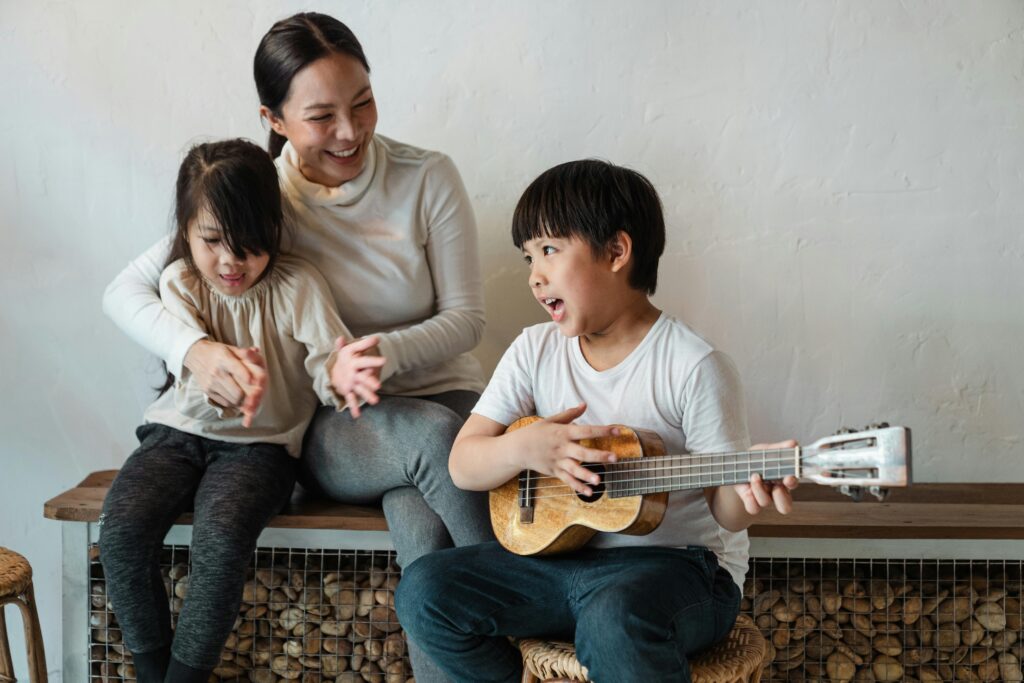When parents picture music practice, they often imagine a child diligently working at the piano or violin while a parent keeps watch. In reality, practice is rarely that neat. It’s messy, repetitive, and full of small frustrations. The way we respond in those moments can shape not only a child’s progress but also their long-term relationship with music.
If kids don’t enjoy practice, they won’t stick with it. No one survives the thousands of hours needed to become a confident musician if practice feels like punishment. The good news? With a few small shifts, you can help make practice enjoyable, structured, and motivating without any music experience!
Tip #1: Focus on Small Wins, Not Minutes
It’s easy to ask, “Did you practice for 30 minutes?” as if the clock alone defines success. But time on the instrument doesn’t always mean progress. Students can spend half an hour repeating the same mistakes and end up frustrated. What really matters is progress. Just like with any new skill, small wins build confidence and momentum, which carry kids forward.
Try encouraging bite-sized goals: “Play that tricky measure three times correctly,” or “Smooth out the transition between these two sections.” Celebrate those victories right away. Achieving small wins will create momentum to keeps kids practicing until the bigger milestones feel possible.
Tip #2: Encourage Effort Instead of Fixing Mistakes
It can be hard to watch a child struggle without stepping in. Many parents naturally want to correct wrong notes or rhythms on the spot. But when kids don’t get the chance to work through mistakes on their own, practice can feel discouraging.
Instead, try encouragement that recognizes effort: “That rhythm is giving you trouble, but I love how you kept going,” or “That tricky spot already sounds better than yesterday.” This kind of support helps kids stay resilient while keeping practice positive.

Tip #3: Adapt Your Support to Your Child’s Personality
Some children thrive with a parent sitting nearby, while others feel more comfortable practicing on their own. Some love to perform every new piece; others prefer to wait until they’re confident. Every child is different, and each needs a different kind of support.
Rather than guessing, ask: “Do you like it when I sit in and listen, or would you rather I check in after?” Letting kids guide this choice shows trust and helps them feel ownership of their practice.
Tip #4: Keep Practice Playful and Personal
When practice is framed like homework, kids often resist. Music, at its best, is rewarding, playful, and creative. Keep the spark alive by weaving in songs kids already love, even if they’re not on the assignment list. A favorite pop tune or game theme can still build technique and make practice something to look forward to.
- Set fun challenges (e.g., “For each clean passthrough, speed the metronome up”).
- Track a simple practice streak or “stars earned” chart.
- End with a mini “performance” for family or a quick video message to a grandparent.
The short-erm goal isn’t perfection; it’s making practice engaging enough that kids want to come back tomorrow. After all, kids look forward to sports practice, so why shouldn’t music feel the same?
Tip #5: Help Kids See Their Progress
All musicians hit motivation dips. When kids don’t notice their own growth, practice can feel discouraging. That’s when they most need a reminder of how far they’ve come.
Make progress visible: record a piece today and play it back a month later; keep a short “before/after” clip of a tough section; celebrate when something that once felt impossible now feels easy. Momentum and visible progress build confidence, and confidence builds persistence. These lessons reach far beyond music. Learning how to set goals, track improvement, and push through challenges shapes not just a stronger musician, but a more capable, resilient, and confident individual.
Key Takeaway
We’ve seen many students grow into skilled musicians, only to lose the desire to play once the pressure disappears. Technical ability alone doesn’t create a lifelong connection to music. In fact, too much pressure can drain away the joy. The surest path to lasting success is keeping practice fun. When kids enjoy the process, they develop both the skills and the desire to keep playing long after the assignments stop, and that’s the very approach we encourage at Better Practice.